- Home
- Jack Kerouac
On the Road Page 30
On the Road Read online
Page 30
5
Then we turned our faces to Mexico with bashfulness and wonder as those dozens of Mexican cats watched us from under their secret hatbrims in the night. Beyond were music and all-night restaurants with smoke pouring out of the door. “Whee,” whispered Dean very softly.
“Thassall!” A Mexican official grinned. “You boys all set. Go ahead. Welcome Mehico. Have good time. Watch you money. Watch you driving. I say this to you personal, I’m Red, everybody call me Red. Ask for Red. Eat good. Don’t worry. Everything fine. Is not hard enjoin yourself in Mehico.”
“Yes!” shuddered Dean and off we went across the street into Mexico on soft feet. We left the car parked, and all three of us abreast went down the Spanish street into the middle of the dull brown lights. Old men sat on chairs in the night and looked like Oriental junkies and oracles. No one was actually looking at us, yet everybody was aware of everything we did. We turned sharp left into the smoky lunchroom and went in to music of campo guitars on an American ’thirties jukebox. Shirt-sleeved Mexican cab-drivers and straw-hatted Mexican hipsters sat at stools, devouring shapeless messes of tortillas, beans, tacos, whatnot. We bought three bottles of cold beer—cerveza was the name of beer—for about thirty Mexican cents or ten American cents each. We bought packs of Mexican cigarettes for six cents each. We gazed and gazed at our wonderful Mexican money that went so far, and played with it and looked around and smiled at everyone. Behind us lay the whole of America and everything Dean and I had previously known about life, and life on the road. We had finally found the magic land at the end of the road and we never dreamed the extent of the magic. “Think of these cats staying up all hours of the night,” whispered Dean. “And think of this big continent ahead of us with those enormous Sierra Madre mountains we saw in the movies, and the jungles all the way down and a whole desert plateau as big as ours and reaching clear down to Guatemala and God knows where, whoo! What’ll we do? What’ll we do? Let’s move!” We got out and went back to the car. One last glimpse of America across the hot lights of the Rio Grande bridge, and we turned our back and fender to it and roared off.
Instantly we were out in the desert and there wasn’t a light or a car for fifty miles across the flats. And just then dawn was coming over the Gulf of Mexico and we began to see the ghostly shapes of yucca cactus and organpipe on all sides. “What a wild country!” I yelped. Dean and I were completely awake. In Laredo we’d been half dead. Stan, who’d been to foreign countries before, just calmly slept in the back seat. Dean and I had the whole of Mexico before us.
“Now, Sal, we’re leaving everything behind us and entering a new and unknown phase of things. All the years and troubles and kicks—and now this! so that we can safely think of nothing else and just go on ahead with our faces stuck out like this, you see, and understand the world as, really and genuinely speaking, other Americans haven’t done before us—they were here, weren’t they? The Mexican war. Cutting across here with cannon.”
“This road,” I told him, “is also the route of old American outlaws who used to skip over the border and go down to old Monterrey, so if you’ll look out on that graying desert and picture the ghost of an old Tombstone hellcat making his lonely exile gallop into the unknown, you’ll see further . . .”
“It’s the world,” said Dean. “My God!” he cried, slapping the wheel. “It’s the world! We can go right on to South America if the road goes. Think of it! Son-of-a-bitch! Gawd-damn!” We rushed on. The dawn spread immediately and we began to see the white sand of the desert and occasional huts in the distance off the road. Dean slowed down to peer at them. “Real beat huts, man, the kind you only find in Death Valley and much worse. These people don’t bother with appearances.” The first town ahead that had any consequence on the map was called Sabinas Hidalgo. We looked forward to it eagerly. “And the road don’t look any different than the American road,” cried Dean, “except one mad thing and if you’ll notice, right here, the mileposts are written in kilometers and they click off the distance to Mexico City. See, it’s the only city in the entire land, everything points to it.” There were only 767 more miles to that metropolis; in kilometers the figure was over a thousand. “Damn! I gotta go!” cried Dean. For a while I closed my eyes in utter exhaustion and kept hearing Dean pound the wheel with his fists and say, “Damn,” and “What kicks!” and “Oh, what a land!” and “Yes!” We arrived at Sabinas Hidalgo, across the desert, at about seven o’clock in the morning. We slowed down completely to see this. We woke up Stan in the back seat. We sat up straight to dig. The main street was muddy and full of holes. On each side were dirty broken-down adobe fronts. Burros walked in the street with packs. Barefoot women watched us from dark doorways. The street was completely crowded with people on foot beginning a new day in the Mexican countryside. Old men with handlebar mustaches stared at us. The sight of three bearded, bedraggled American youths instead of the usual well-dressed tourists was of unusual interest to them. We bounced along over Main Street at ten miles an hour, taking everything in. A group of girls walked directly in front of us. As we bounced by, one of them said, “Where you going, man?”
I turned to Dean, amazed. “Did you hear what she said?”
Dean was so astounded he kept on driving slowly and saying, “Yes, I heard what she said, I certainly damn well did, oh me, oh my, I don’t know what to do I’m so excited and sweetened in this morning world. We’ve finally got to heaven. It couldn’t be cooler, it couldn’t be grander, it couldn’t be anything.”
“Well, let’s go back and pick em up!” I said.
“Yes,” said Dean and drove right on at five miles an hour. He was knocked out, he didn’t have to do the usual things he would have done in America. “There’s millions of them all along the road!” he said. Nevertheless he U-turned and came by the girls again. They were headed for work in the fields; they smiled at us. Dean stared at them with rocky eyes. “Damn,” he said under his breath. “Oh! This is too great to be true. Gurls, gurls. And particularly right now in my stage and condition, Sal, I am digging the interiors of these homes as we pass them—these gone doorways and you look inside and see beds of straw and little brown kids sleeping and stirring to wake, their thoughts congealing from the empty mind of sleep, their selves rising, and the mothers cooking up breakfast in iron pots, and dig them shutters they have for windows and the old men, the old men are so cool and grand and not bothered by anything. There’s no suspicion here, nothing like that. Everybody’s cool, everybody looks at you with such straight brown eyes and they don’t say anything, just look, and in that look all of the human qualities are soft and subdued and still there. Dig all the foolish stories you read about Mexico and the sleeping gringo and all that crap—and crap about greasers and so on—and all it is, people here are straight and kind and don’t put down any bull. I’m so amazed by this.” Schooled in the raw road night, Dean was come into the world to see it. He bent over the wheel and looked both ways and rolled along slowly. We stopped for gas the other side of Sabinas Hidalgo. Here a congregation of local straw-hatted ranchers with handlebar mustaches growled and joked in front of antique gas-pumps. Across the fields an old man plodded with a burro in front of his switch stick. The sun rose pure on pure and ancient activities of human life.
Now we resumed the road to Monterrey. The great mountains rose snow-capped before us; we bowled right for them. A gap widened and wound up a pass and we went with it. In a matter of minutes we were out of the mesquite desert and climbing among cool airs in a road with a stone wall along the precipice side and great whitewashed names of presidents on the cliffsides—ALEMAN! We met nobody on this high road. It wound among the clouds and took us to the great plateau on top. Across this plateau the big manufacturing town of Monterrey sent smoke to the blue skies with their enormous Gulf clouds written across the bowl of day like fleece. Entering Monterrey was like entering Detroit, among great long walls of factories, except for the burros that sunned in the grass before them and the sight of t
hick city adobe neighborhoods with thousands of shifty hipsters hanging around doorways and whores looking out of windows and strange shops that might have sold anything and narrow sidewalks crowded with Hongkong-like humanity. “Yow!” yelled Dean. “And all in that sun. Have you dug this Mexican sun, Sal? It makes you high. Whoo! I want to get on and on—this road drives me!!” We mentioned stopping in the excitements of Monterrey, but Dean wanted to make extra-special time to get to Mexico City, and besides he knew the road would get more interesting, especially ahead, always ahead. He drove like a fiend and never rested. Stan and I were completely bushed and gave it up and had to sleep. I looked up outside Monterrey and saw enormous weird twin peaks beyond Old Monterrey, beyond where the outlaws went.
Montemorelos was ahead, a descent again to hotter altitudes. It grew exceedingly hot and strange. Dean absolutely had to wake me up to see this. “Look, Sal, you must not miss.” I looked. We were going through swamps and alongside the road at ragged intervals strange Mexicans in tattered rags walked along with machetes hanging from their rope belts, and some of them cut at the bushes. They all stopped to watch us without expression. Through the tangled bush we occasionally saw thatched huts with African-like bamboo walls, just stick huts. Strange young girls, dark as the moon, stared from mysterious verdant doorways. “Oh, man, I want to stop and twiddle thumbs with the little darlings,” cried Dean, “but notice the old lady or the old man is always somewhere around—in the back usually, sometimes a hundred yards, gathering twigs and wood or tending animals. They’re never alone. Nobody’s ever alone in this country. While you’ve been sleeping I’ve been digging this road and this country, and if I could only tell you all the thoughts I’ve had, man!” He was sweating. His eyes were red-streaked and mad and also subdued and tender—he had found people like himself. We bowled right through the endless swamp country at a steady forty-five. “Sal, I think the country won’t change for a long time. If you’ll drive, I’ll sleep now.”
I took the wheel and drove among reveries of my own, through Linares, through hot, flat swamp country, across the steaming Rio Soto la Marina near Hidalgo, and on. A great verdant jungle valley with long fields of green crops opened before me. Groups of men watched us pass from a narrow old-fashioned bridge. The hot river flowed. Then we rose in altitude till a kind of desert country began reappearing. The city of Gregoria was ahead. The boys were sleeping, and I was alone in my eternity at the wheel, and the road ran straight as an arrow. Not like driving across Carolina, or Texas, or Arizona, or Illinois; but like driving across the world and into the places where we would finally learn ourselves among the Fellahin Indians of the world, the essential strain of the basic primitive, wailing humanity that stretches in a belt around the equatorial belly of the world from Malaya (the long fingernail of China) to India the great subcontinent to Arabia to Morocco to the selfsame deserts and jungles of Mexico and over the waves to Polynesia to mystic Siam of the Yellow Robe and on around, on around, so that you hear the same mournful wail by the rotted walls of Cádiz, Spain, that you hear 12,000 miles around in the depths of Benares the Capital of the World. These people were unmistakably Indians and were not at all like the Pedros and Pan chos of silly civilized American lore—they had high cheekbones, and slanted eyes, and soft ways; they were not fools, they were not clowns; they were great, grave Indians and they were the source of mankind and the fathers of it. The waves are Chinese, but the earth is an Indian thing. As essential as rocks in the desert are they in the desert of “history.” And they knew this when we passed, ostensibly self-important moneybag Americans on a lark in their land; they knew who was the father and who was the son of antique life on earth, and made no comment. For when destruction comes to the world of “history” and the Apocalypse of the Fellahin returns once more as so many times before, people will still stare with the same eyes from the caves of Mexico as well as from the caves of Bali, where it all began and where Adam was suckled and taught to know. These were my growing thoughts as I drove the car into the hot, sunbaked town of Gregoria.
Earlier, back at San Antonio, I had promised Dean, as a joke, that I would get him a girl. It was a bet and a challenge. As I pulled up the car at the gas station near sunny Gregoria a kid came across the road on tattered feet, carrying an enormous windshield-shade, and wanted to know if I’d buy. “You like? Sixty peso. Habla Español? Sesenta peso. My name Victor.”
“Nah,” I said jokingly, “buy señorita.”
“Sure, sure!” he cried excitedly. “I get you gurls, onnytime. Too hot now,” he added with distaste. “No good gurls when hot day. Wait tonight. You like shade?”
I didn’t want the shade but I wanted the girls. I woke up Dean. “Hey, man, I told you in Texas I’d get you a girl—all right, stretch your bones and wake up, boy; we’ve got girls waiting for us.”
“What? what?” he cried, leaping up, haggard. “Where? where?”
“This boy Victor’s going to show us where.”
“Well, lessgo, lessgo!” Dean leaped out of the car and clasped Victor’s hand. There was a group of other boys hanging around the station and grinning, half of them barefoot, all wearing floppy straw hats. “Man,” said Dean to me, “ain’t this a nice way to spend an afternoon. It’s so much cooler than Denver poolhalls. Victor, you got gurls? Where? A donde?” he cried in Spanish. “Dig that, Sal, I’m speaking Spanish.”
“Ask him if we can get any tea. Hey kid, you got ma-ree-wa-na?”
The kid nodded gravely. “Sho, onnytime, mon. Come with me.”
“Hee! Whee! Hoo!” yelled Dean. He was wide awake and jumping up and down in that drowsy Mexican street. “Let’s all go!” I was passing Lucky Strikes to the other boys. They were getting great pleasure out of us and especially Dean. They turned to one another with cupped hands and rattled off comments about the mad American cat. “Dig them, Sal, talking about us and digging. Oh my goodness, what a world!” Victor got in the car with us, and we lurched off. Stan Shephard had been sleeping soundly and woke up to this madness.
We drove way out to the desert the other side of town and turned on a rutty dirt road that made the car bounce as never before. Up ahead was Victor’s house. It sat on the edge of cactus flats overtopped by a few trees, just an adobe crackerbox, with a few men lounging around in the yard. “Who that?” cried Dean, all excited.
“Those my brothers. My mother there too. My sistair too. That my family. I married, I live downtown.”
“What about your mother?” Dean flinched. “What she say about marijuana.”
“Oh, she get it for me.” And as we waited in the car Victor got out and loped over to the house and said a few words to an old lady, who promptly turned and went to the garden in back and began gathering dry fronds of marijuana that had been pulled off the plants and left to dry in the desert sun. Meanwhile Victor’s brothers grinned from under a tree. They were coming over to meet us but it would take a while for them to get up and walk over. Victor came back, grinning sweetly.
“Man,” said Dean, “that Victor is the sweetest, gonest, fran ticest little bangtail cat I’ve ever in all my life met. Just look at him, look at his cool slow walk. There’s no need to hurry around here.” A steady, insistent desert breeze blew into the car. It was very hot.
“You see how hot?” said Victor, sitting down with Dean in the front seat and pointing up at the burning roof of the Ford. “You have ma-ree-gwana and it no hot no more. You wait.”
“Yes,” said Dean, adjusting his dark glasses, “I wait. For sure, Victor m’boy.”
Presently Victor’s tall brother came ambling along with some weed piled on a page of newspaper. He dumped it on Victor’s lap and leaned casually on the door of the car to nod and smile at us and say, “Hallo.” Dean nodded and smiled pleasantly at him. Nobody talked; it was fine. Victor proceeded to roll the biggest bomber anybody ever saw. He rolled (using brown bag paper) what amounted to a tremendous Corona cigar of tea. It was huge. Dean stared at it, popeyed. Victor casually lit it an
d passed it around. To drag on this thing was like leaning over a chimney and inhaling. It blew into your throat in one great blast of heat. We held our breaths and all let out just about simultaneously. Instantly we were all high. The sweat froze on our foreheads and it was suddenly like the beach at Acapulco. I looked out the back window of the car, and another and the strangest of Victor’s brothers—a tall Peruvian of an Indian with a sash over his shoulder—leaned grinning on a post, too bashful to come up and shake hands. It seemed the car was surrounded by brothers, for another one appeared on Dean’s side. Then the strangest thing happened. Everybody became so high that usual formalities were dispensed with and the things of immediate interest were concentrated on, and now it was the strangeness of Americans and Mexicans blasting together on the desert and, more than that, the strangeness of seeing in close proximity the faces and pores of skins and calluses of fingers and general abashed cheekbones of another world. So the Indian brothers began talking about us in low voices and commenting; you saw them look, and size, and compare mutualities of impression, or correct and modify, “Yeh, yeh” while Dean and Stan and I commented on them in English.

 Tristessa
Tristessa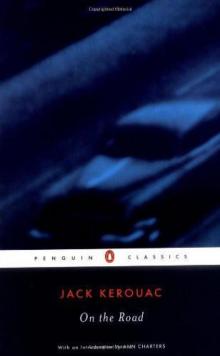 On the Road
On the Road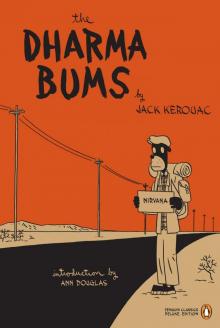 The Dharma Bums
The Dharma Bums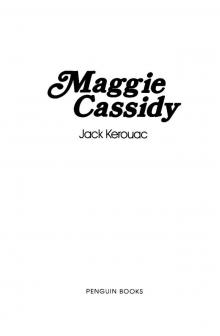 Maggie Cassidy
Maggie Cassidy Big Sur
Big Sur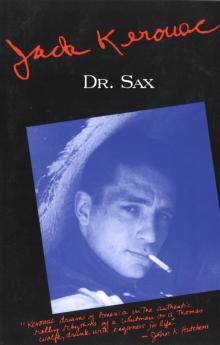 Dr. Sax
Dr. Sax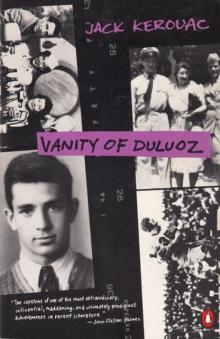 Vanity of Duluoz: An Adventurous Education, 1935-46
Vanity of Duluoz: An Adventurous Education, 1935-46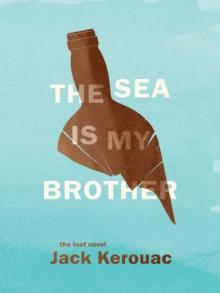 The Sea Is My Brother
The Sea Is My Brother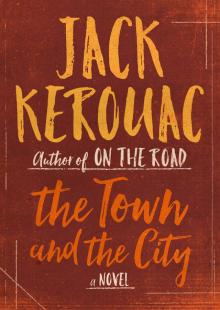 The Town and the City: A Novel
The Town and the City: A Novel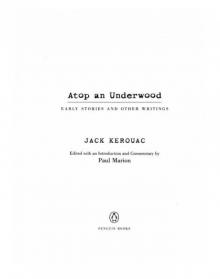 Atop an Underwood: Early Stories and Other Writings
Atop an Underwood: Early Stories and Other Writings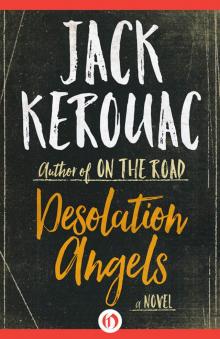 Desolation Angels: A Novel
Desolation Angels: A Novel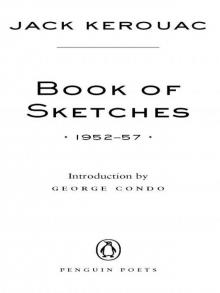 Book of Sketches
Book of Sketches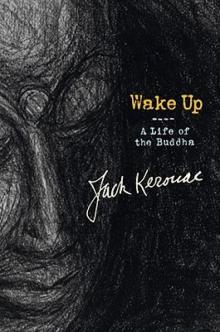 Wake Up: A Life of the Buddha
Wake Up: A Life of the Buddha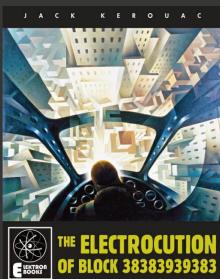 The Electrocution of Block 38383939383
The Electrocution of Block 38383939383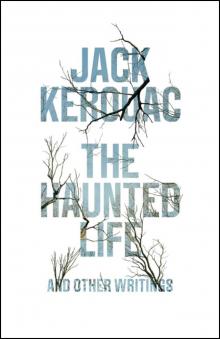 Haunted Life
Haunted Life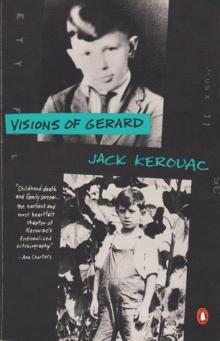 Visions of Gerard
Visions of Gerard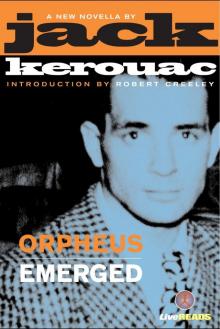 Orpheus Emerged
Orpheus Emerged Book of Blues
Book of Blues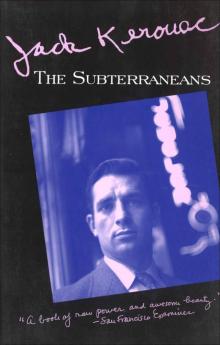 The Subterraneans
The Subterraneans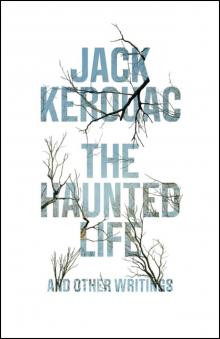 The Haunted Life
The Haunted Life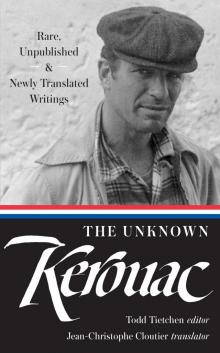 The Unknown Kerouac
The Unknown Kerouac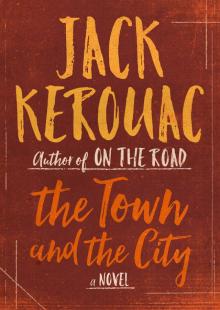 The Town and the City
The Town and the City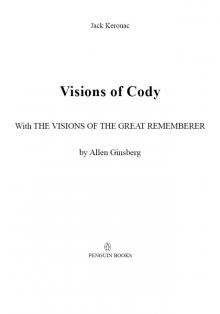 Visions of Cody
Visions of Cody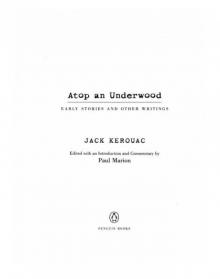 Atop an Underwood
Atop an Underwood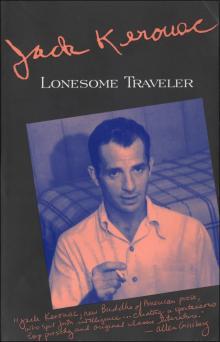 Lonesome Traveler
Lonesome Traveler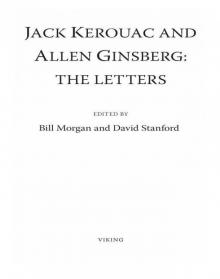 Jack Kerouac and Allen Ginsberg
Jack Kerouac and Allen Ginsberg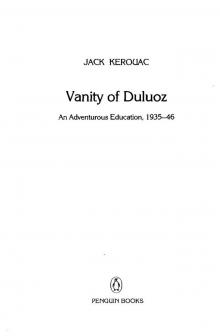 Vanity of Duluoz
Vanity of Duluoz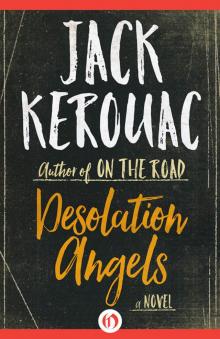 Desolation Angels
Desolation Angels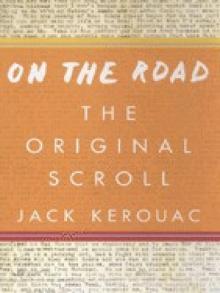 On the Road: The Original Scroll: (Penguin Classics Deluxe Edition)
On the Road: The Original Scroll: (Penguin Classics Deluxe Edition)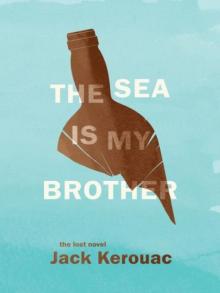 The Sea Is My Brother: The Lost Novel
The Sea Is My Brother: The Lost Novel Wake Up
Wake Up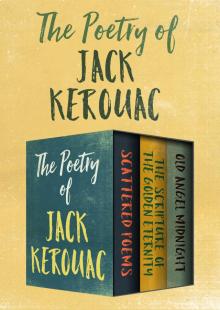 The Poetry of Jack Kerouac
The Poetry of Jack Kerouac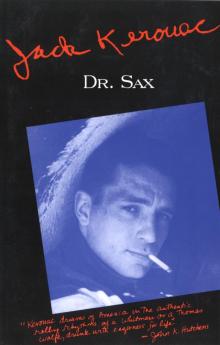 Doctor Sax
Doctor Sax